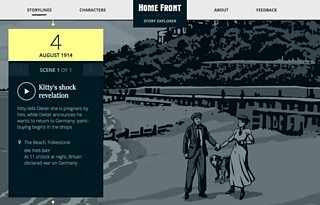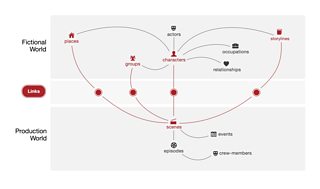Βι¶ΉΤΌΕΔ Front Story Explorer: Putting Βι¶ΉΤΌΕΔ drama on the web
Tristan Ferne
Lead Producer
Have you ever started a new series of a drama but struggled to remember what happened in the previous series? Or could you not quite place that character and why she's behaving suspiciously? Or did you get distracted and missed a crucial plot point? What if it's too late to watch it again in Βι¶ΉΤΌΕΔ iPlayer or maybe you just don't have time?
We have been trying to solve these problems and we've just launched a that does this for the Βι¶ΉΤΌΕΔ radio drama, Βι¶ΉΤΌΕΔ Front.
Βι¶ΉΤΌΕΔ Front is an epic radio drama series set in Britain during World War One and 4. The Βι¶ΉΤΌΕΔ Front Story Explorer provides a new way to enjoy and understand the drama across three seasons, sixteen storylines and over twenty-one hours of listening. It allows you to trace individual storylines, listen or catch up via key events, follow characters and find the moments you love. It is like an interactive box set companion, immersing you in the fictional universe. Built around interlinked characters, storylines and moments, driven by data and represented with illustrations, text and audio.
Why we are doing this?
Βι¶ΉΤΌΕΔ Front is a long-running drama with interlinking storylines, many characters and set against a historical backdrop, making it an ideal candidate for our experiment. In addition, the programme has 10 year worldwide rights for the audio meaning we could experiment with it in public.
The prototype is aimed at both existing and potential new listeners and lets you...
- Quickly recap on what you've previously heard.
- Catch up on things you might have missed.
- Better understand what happened and why.
- Follow individual storylines or characters.
- More easily get into a new drama that you've previously missed.
- Find background material on real-life issues and history.
- Point to and share your favourite bits.
In addition we wanted to provide an enhanced audio experience on the web, and so created bespoke illustrations to go alongside the audio.
The aim of our experiment is to find out if it does help with the problems we've identified, specifically...
- Does it help you orientate yourself when starting to listen?
- Does it help you catch up and recap?
- Is it useful to have text summaries as well as the original media?
- Which bits of information are most important to know and is there anything missing?
- Does it make sense to break a programme into storylines, events and characters?
- Does it matter that there may be ?
- Could it work as a complete listening experience?
What is it?

We have broken down the first three series of Βι¶ΉΤΌΕΔ Front into 16 individual, but interlocking, storylines. Every storyline is then broken down into scenes, with each scene occurring exactly 100 years prior to the day it was broadcast. Every scene has an illustration, audio, key characters and a description of what happens. For three featured storylines we have also highlighted the key events to help summarise them, with an option to browse the full storyline. You can browse through them, reading the descriptions, or just press play and listen to every moment. You can even subscribe to a podcast dedicated to just that storyline.
Finally there are snippets of history for each day and links to other websites, such as , that explore the historical events and themes of World War One.

Each of the 86 characters has an illustrated portrait, a biography and a voice sample - useful for when you can't work out who's speaking.
Background
With the rise of various technologies meaning viewers and listeners never miss an episode, storytelling on TV has become much more complex.
“In the past 15 years, television’s storytelling possibilities and practices have undergone drastic shifts in a medium-specific way. What was once a risky innovative device, like subjective narration or jumbled chronology, is now almost cliché. Where the lines between serial and episode narratives used to be firmly drawn, today such boundaries are blurred. The idea that viewers would want to watch - and rewatch - a television series in strict chronology and collectively document their discoveries with a group of strangers was once laughable, but is now mainstream”
From
Βι¶ΉΤΌΕΔ R&D has extensively researched new ways of representing stories on the web, aiming to enhance the understanding and enjoyment of the stories that the Βι¶ΉΤΌΕΔ tells. Our focus is on exploring the use of data to create new experiences for our audiences by breaking stories up into storylines, characters and moments. We have previously experimented with the stories of , and even .
We think there is an opportunity for the web to better support programmes and their stories. There are, of course, many and that describe and discuss popular dramas and we think the Βι¶ΉΤΌΕΔ could support this need too, making something informative, attractive, scalable and linked through to the rest of the Βι¶ΉΤΌΕΔ and the web. Imagine the Story Explorer for your favourite drama. Doctor Who or Casualty or Luther or Poldark or Wolf Hall or The Killing. Is that something that you would like?
In our work we have developed a common data model for stories designed to work across any drama or soap on TV and radio, or even to capture the stories in factual programmes and news. One of our challenges is how to efficiently create this data for programmes and we are building tools to help production teams - there will be a follow-up post with more detail on this.

A data model designed for production tools and audience-facing experiences. Fictional characters, relationships, places & storylines are linked to the production world of scenes & episodes
We will be continuing to work on this prototype and these concepts - we'd like to try this for a TV drama, we're thinking about making a radio that shows which character is speaking and we'll look again at how the concepts would work for news stories and beyond.
If this has made you want to listen to Βι¶ΉΤΌΕΔ Front then series 4 is currently being and is also available . You can also from Βι¶ΉΤΌΕΔ Front's editor Jessica Dromgoole.
You can try out the now on .
